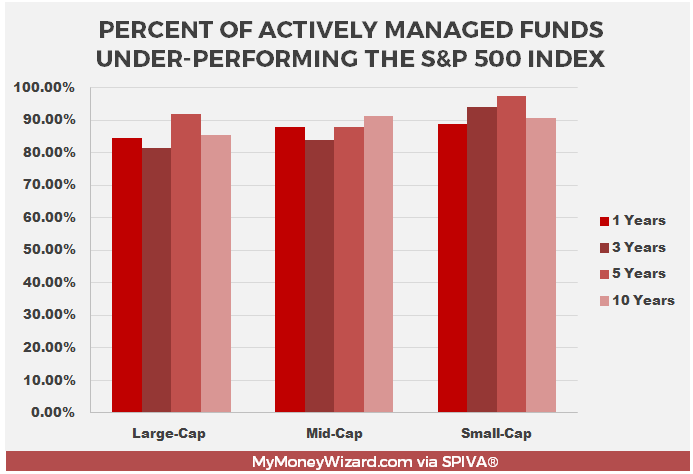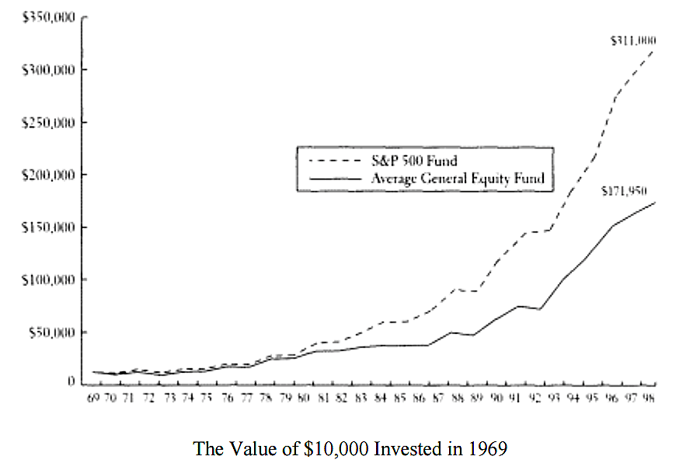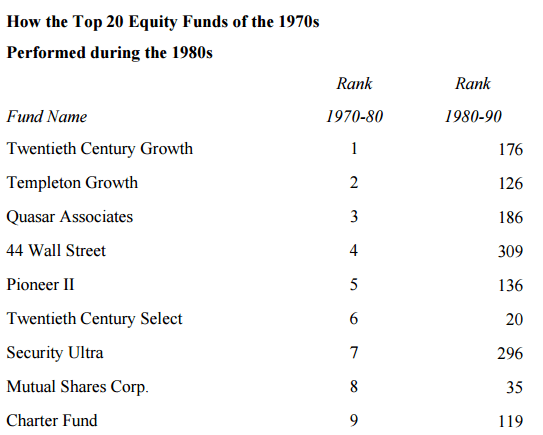
You can make money trading individual stocks.
Phew, I typed that opinion on a personal finance site, and my web page didn’t implode on itself from the incredulity of thousands of personal finance bloggers across the globe.
You see, the common line of thinking in the personal finance blogosphere goes something like this:
- “You can never make money individually picking stocks, idiot.”
- “Index fund investing is the one and only way to make money in the market.”
- “I still can’t believe you thought you could make money buying anything besides the index fund, idiot.”
I’m obviously having one of my truth stretching fake dialogue moments, but the above isn’t far from the prevailing opinion of oh, about 99.99% of personal finance bloggers.
Despite the blogosphere’s attempt to burn any stock traders at the stake, there’s still plenty of examples of investors consistently beating the market.
For those firmly in the camp of “profiting off stock trading is impossible,” how do you explain Michael Steinhardt’s legendary hedge fund, which returned 24.5 percent per year over a 28 year period, even after accounting for fees? That’s several percentage points of excess return above and beyond The Holy Indexes’ 7 percent.
Or what about George Soros’ Quantum Fund, which has returned $40 billion since its inception in 1973?
Obviously there’s Warren Buffet, who’s lifetime return is somewhere around 20 percent per year. Hell, the last few pages of Benjamin Graham’s investment classic The Intelligent Investor has a whole appendix of Graham disciples who have used his teachings to post annualized returns 5-10% above and beyond the index for over 25 years.
Then there’s the Medallion Fund, which is possibly the most profitable and super-secret hedge fund in the world. Over the past three decades, their team of scientists and Ph.Ds. have managed a money printing machine that’s produced $55 billion in profit from just $9-10 billion of capital. That’s an annual return of almost 80 percent per year.
I can see you salivating now. 80 percent returns sure sound nice, don’t they? You and me both, amigo.
But we’d be wise to pump those breaks…
Here’s the truth. You can actually make money investing or trading individual stocks… But just because you can, doesn’t mean you should.
Finance’s Dirty Secret: Almost Every Stock Trader Fails to Beat the Market
Now that we’ve got the exceptions out of the way, let’s get to the undeniable fact. Statistically, most stock traders lose money.
And by “stock trader,” I’m not just talking about some twitchy, get rich quick dreamer analyzing charts in the basement of his parent’s grungy house. This category also includes that well compensated Personal Financial Planner who’s using his “expertise” to invest your money into actively traded mutual funds.
How bad is the epidemic of “experts” failing to post results? A SPIVA study showed that approximately 85% of active fund managers under-performed the S&P 500 index.

We could go on for a days about the stats. Burton Malkiel, in his classic summary of efficient markets titled A Random Walk Down Wall Street, points out that years of academic study showed the average active mutual fund trailed the overall stock market by 3.3% annually.

Worse, the few funds who did outperform the market in one time period often had disastrous results over the next time period.

Reformed former big-time actively traded mutual fund manager, John Bogle, performed his own analysis of the mutual fund industry, only to find the average fund under-performed a basket of untouched stocks by somewhere around 1.5% per year.
His startling revelation led him to exit the actively traded industry forever and create the world’s first index fund at Vanguard.
Why Mutual Fund Managers Can’t Beat the Market
The people running these hedge funds aren’t all stupid. They’re often incredibly brilliant people, with an unbelievable understanding of the market. Unfortunately, this is unlikely to translate to results for you.
Even if a fund manager is smart (or lucky) enough to beat the market on his own, frequently trading stocks means they’re swimming against the tide if you ever want to see any of those profits.
Frequent trading incurs three huge costs which don’t show up in the mutual funds already bloated operating costs (hey, somebody’s gotta pay those marketing costs and multi-million dollar fund manager salaries):
1. Transaction Costs
Transaction costs come in a number of forms:
- Buying and selling stocks creates fees to brokerages, often $5-10 per trade. Constantly trading throughout the day racks this bill up quickly.
- Large mutual funds making big purchases can actually move the price of a stock before the transaction is complete. For example, a fund purchasing a cheap stock can actually bid the price of the stock upwards during the transaction, making the good deal disappear as money is moved into the investment.
- Bid-ask spread is the difference between the price one person is willing to sell and another is willing to buy. Typically this amount is small, only a few cents per share, but constantly trading can increase the impact of this effect.
2. Taxes
Like transaction costs, taxes slowly eat you alive. The more trades, the more taxes. Short term capital gains taxes are 10-39.6% depending on your income, and actively managed funds pass these gains off to you, the fund investor.
3. Fund managers are at the mercy of the fund’s individual investors
Most individual investors, to put it kindly, are idiots with their money. Even the filthy rich aren’t immune to the emotional roller coaster of investing. They panic like the rest of us, and this is the sort of erratic panic that puts even the brightest fund managers at the mercy of their clients.
Look at it this way – imagine a mutual fund invested in the stock market that has raised $10 million from a bunch of individual investors.
As the market begins to rally, the mutual fund does well. Seeing their fund returning well, those investors get excited about their investment. They decide this manager clearly knows what he’s doing, since the fund has made so much money, so they pour more money into the fund. This forces the manager to buy more assets after the price has already run up.
When the market cycle swings in the other direction and stock prices begin to fall, the latest fund report is released and shows a big whopping loss. The investors panic. “This fund is losing me money!” they say, so they pull their money out of the fund.
In order for the fund to pay out to these investors, the manager is now forced to sell some of the fund’s investments at rock bottom prices.
In other words, most fund managers have no choice but to buy when the market is overpriced and sell after stocks lose money – the exact opposite of a sound investment strategy.
What About Individual Stock Traders?
Okay, so active mutual funds are obviously out. Maybe you’re feeling like going solo?
I wouldn’t get those hopes up just yet. The results for individual investors aren’t much better. In fact, recent research indicates approximately 99% of individual stock pickers performing worse than the index.
Why? Individual stock pickers suffer from most of the same ailments as the professional mutual fund managers, such as taxes and transaction fees. Plus, it’s important to remember – the stock market is a market. There is a buyer and a seller at the end of every trade, making the stock market a zero sum game.
Could you be the 1 out of 100? Maybe, but think of your competition:
- Do you really expect to know more about Apple’s stock than Goldman Sachs does? The massive investment firm employs thousands of the brightest finance students from the nation’s top business schools, who are assigned nothing more than to analyze ever minutia of the big name stocks for 10 to 12 hours a day.
- The Medallion Fund is the Manhattan Project of the financial markets. Of the company’s 300 employees, 90 are Ph.Ds. and the rest are the most brilliant scientific minds, math geniuses, and computer programmers from around the world.
- Warren Buffet famously read 600-1,000 pages per day when he was starting his investing career, and today he still spends 6+ hours of every day reading annual reports and investing literature.
This who you’re trading against. If you’re not willing to put in that sort of effort, you’re the sucker at the table.
The Easy Solution – Index Funds
So, if approximately 90% of mutual funds and 99% of individual traders are lagging the index benchmark, wouldn’t it be great to just invest directly into the index?
Yes! It would! And lucky for all of us, there’s an extremely easy way to do so – index funds.
Index Funds invest directly in the broad market, so rather than lagging the S&P 500 like almost everyone else, you simply track the S&P 500. No active management, no frequent trading, and no huge fees incurred.
Done and done. This simple approach will leave you wealthier than 99% of the traders obsessing over the latest charts, news, speculation, and buzz.
You won’t have to read thousands of pages per day, and you won’t be lining the expensive suit pockets of some fund manager who’s actually losing you money.
Rather than stressing over your investments, you’re free to set it and forget it. You’re free to enjoy life.
Want to know the smartest and easiest way to invest in index funds? Check out the follow up article: 3 Fund Portfolio: The Lazy Investing Strategy that Crushes the Pros
_______________________________________________________________
Related Articles:


Great article, the other thing to mention is that the average out-performance of the few funds that out-perform their indices is lower than the average under-performance of the funds that fall short of the index. If you are making a bet that you are likely to lose you need a better payout!
Excellent point Dan. Sort of a “Heads you win $10, tails you lose $20” kind of raw deal.
Finally! Thank you for being the ONLY blogger I can find in recent history who admits you can make decent money investing in individual stocks. No, it isn’t easy. You can’t do it trading (I haven’t bought any individual stocks in 5 or 6 years). It requires a lot of work and patience (before the internet…god, I am old…I would write letters to companies requesting their annual reports). And you will make mistakes that will cost you thousands of dollars (sadly spoken from experience!).
Index funds are absolutely the best alternative for someone who isn’t willing to put in the time or effort to learn about the process. That said, I don’t believe I would have been able to retire early if 100% of my investments were in index funds. Even counting several gut wrenching losses over the years, the individual stock portion of my investments have outperformed the index portion by a large margin.
Thanks for the insight and wisdom Dan!
I think too often, buying and holding individual companies gets unfairly lumped in with stock trading. The two couldn’t be more different, and the track record for your approach is far better than the frequent traders who are going bust left and right.
Reading this post makes me feel much better whenever I see another post on reddit “All /pf folks believing in index funds BS. I trade individual stocks and I make waaay more money.”
I cannot argue with statistics and I don’t believe I would be in the outperforming minority if I were to buy individual stocks.
I always view those posts with one eyebrow raised. Statistically almost no traders are consistently making money, so I’d chalk a lot of those stories up to “internet tall tales.”
Beating the market might be easier than you think. Here is a mud-covered trash dump worker who beat the best investing minds of Harvard, Yale, and Columbia for ten years:
https://howibeatgold.wordpress.com/2017/01/25/trash-dump-worker-invests-better-than-harvard-yale-and-columbia/
If anything, that article is more support for indexing. The best investing minds from Yale and Columbia earned 8.1% per year from 2006 to 2016, while the index fund earned 7.5%. In other words, after fees an investor who had hypothetical access to an Ivy League investment fund would have only matched the index fund. And Harvard investors, who earned 1.8% less than the stock market, would have been much better off in the index fund.
And for each trash dump worker who earned a crazy return with a high risk investment strategy, there’s probably 10 who lost everything.
I agree with your entire comment except for the part that calls my investment strategy high risk.
If my investment strategy were high risk, then my stock portfolio would have likely gone to zero in the past 4 years since my previous reply above.
But I have made financial progress in the past 4 years. My investment track record is now over 14 years long:
http://3yeardouble.blogspot.com/2021/03/i-am-now-beating-gold-by-1009-per-year.html?m=1
My stock portfolio is now worth over $800k as I have shown with screenshots in the link above.
I consider my investment strategy low risk because I look for high value and buy only at low prices. My investments are highly volatile, but I consider high volatility to be nothing more than frequent opportunities for cheap purchases.
Look up proptrading. These guys do fulltime trading as a profession and make money consistently. Its possible, not easy but its possible